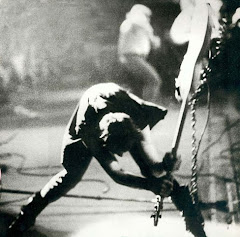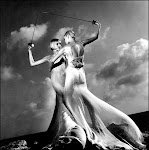
My mother once told me I came out of her womb clutching. "Your hands," she said to me, "Were so tiny, but they were so strong. They'd grab on to anything within reach and hang on. I had the hardest time getting you to let go."
Nothing was safe, she said. As an infant it was her hair. The collar of her shirt. The locket she wore most of her life and which I now wear on a regular basis as well. As I got older and started to move around, I'd latch on to whatever happened to catch my attention for that day—a blanket, a book, one of my mother's nicknacks, utensils (apparently I was very fond of spoons) and carry that object with me for the duration of the day, letting go only in sleep, and sometimes not even then. That bear up there, it was the first among many that my father bought me in an attempt to keep me from pilfering his tools.
As I got a little older, I started to collect things. Rocks. Bits of animal bone, wildflowers, and the discarded soda bottles that littered the land surrounding the ranch where I grew up. Once, while walking with my mother, I found the molted skin of a rattlesnake, nearly whole, translucent like rice paper and just as fragile. I begged my mother to let me take it home and she finally agreed. She, too, understood the tug of objects and so I brought it home and put it in the garden where it remained for a few days until my brother came along and ripped it to shreds. My brother was always, always messing with my stuff. He knew it was the one button he could push that would send me nuclear (I eventually lost that bear up there because he tossed it into the fire.) and few things in life gave him quite the same pleasure as sending me nuclear.
Fast forward to present day. I still clutch and collect. I can't help it. Materialism is as firmly encoded in my DNA as my eye color. Most humans, too, probably. Last time I checked, our species wasn't living in some Star Trek episode, reduced to pure brain matter, our bodies long discarded just like that snake skin, the effluence of a burdensome and ultimately useless organic existence. Last time I checked, we humans remain resolutely material ourselves, as solidly situated in time and space as that rock over there, even though, like the planet itself, we are about 75 percent water. Still, we cannot walk through walls or use our minds to shift objects.
So, I wonder: What are we at this point in our evolutionary history, if not a species evolved to make, to trade, to covet, to collect? And, by extension, what could be more important to our history than the stories told by the objects we make?
Of all the things I have collected over the years, I think this piece tells one of my favorite stories. I bought it two summers ago at the International Folk Art Market in Santa Fe from Zimbabwe story quilt artist Elizabeth Savanhu.

Because most Weyan quilt artists produce their work as part of a collective, their individual names usually remain anonymous. Elizabeth, however, had for some reason been singled out by the fair organizers. I was immediately drawn to her work and spent quite a bit of time speaking with her. This was her first-ever trip outside her village. In addition to the excitement of the plane ride over, she also got to spend two days in New York City before continuing on to Santa Fe, which she found to be very beautiful, too, but was wondering how two such different cities could exist in one country?
Elizabeth had so many beautiful quilts of all sizes that I was having a hard time deciding which one to buy. Eventually, it was the figure of the dog in this one that made up my mind. He is, Elizabeth told me, her favorite dog out of the three that her family cares for and so she gave him a place of prominence in two of the quilt's panels.
The first thing I did when I got home that evening was hang the quilt on a section of wall in my office, but it wasn't until the next morning that I actually noticed the smell of smoke. Not cigarette smoke, but more like the smell of burnt wood. It took me a few minutes to get it: the smoke smell was coming from the quilt. And it was coming from the quilt because most likely the only light available in Elizabeth's village after the sun went down was from campfires.
That was where she would sit, in the evenings after school and after chores and dinner: in front of a campfire in the middle of Africa, in a place so far removed from my life in America that it may as well be on the moon, making this object of beauty that she carried with her across an ocean and two continents, whose smell of smoke was not the gap between Africa and me, but the bridge, so that I could know and understand the story of Elizabeth and she could know and understand the story of me, always clutching.






12 comments:
I often wonder about the circumstances behind hand-made (and even assembly line made) things. Was it created in a nice shop, parking lot or abandon building. Cool story.
I have to say about your picture holding the doll. My first thought was "Well, Clarice - have the lambs stopped screaming?" Bwahahaha
I had a similar conversation with my brother over the weekend... that there is a reason as humans we have the need to collect objects and adorn our lives with them. It's in our DNA and as long as we don't end up on an episode of horders, it's wonderful to gather and collect. I love your story of the quilt and I've seen the locket around your neck. :-)
What a thoughtful and beautifully written post. And what a gorgeous quilt. Thanks so much for sharing this story.
BTW, that is a seriously cute picture of Mini-Moi!
Buzz: I do look a wee bit distraught, don't I?
Boxer: I think eBay saved me from hoarding. Because as much as I like collecting, I like selling, too. So that, you know, I can buy MORE stuff :o)
Eggplant: Thank you!
Boxer: I remember my mother always struggling with my hair. Hence, the choppy-choppy that soon followed this photo.
So you WASHED the quilt, right ?
What a cool story! I think I like to collect objects, natural, man made and otherwise, is because I like to look at them and enjoy them at leisure. A shell, stone, feather, et al, that I found in a particular place will forever remind me (as long as I have my memory) of a past time. Some are sad times, most are good and fun.
I love that you could smell the smoke of the quilt, titillating the nose as well as the eyes.
You were a cute kid! Your brother sounded like he was a little ba$tard!!! Nice post, Moi.
what an enchantin' post!
The story quilt is simply wonderful wonderful wonderful. But then I writer WOULD love a story, however told. Heh.
And clutchy Moi is adorable!
Maybe not "more" important but "equally" important is the stories which are told by the items we clutch.
" That which we choose to surround ourselves with becomes the museum of our own experiences".
Thomas Jefferson
Also the mission statememnt for FishyDesigns.
Yes the quilt tells a story, yes the quilt communicates data from the life of the artist, yes the quilt is a bridge between women, their respective cultures and their common denominators. Yes the quilt is a lovely object worthy of a lifelong, keep it away from your brother, clutch .
More importantly, this quilt passed through the life of the artist. One among many. In time, the artist will not remember the specifics of this quilt. However, this quilt will stay clutched in your heart and grace your home for all your days. It now is part of the museum of your life experiences. The quilt is now your story and no longer that of the quiltmaker. It is the colorful, exhuberant , vibrant statement of that bear clutching child in black and white.
Moi, if you were a child of the FishySchool, I would say that expression is "determination". I'm guessing determination is a large part of your character that showed up early in life. I hope you have this photo matted and framed on your best museum wall?
What a wonderful post Moi. It is a terrific way to start my morning. Have a great day.
Heff: No, the smoke smell disappeared on its own. I was kind of sad to see it go.
La Diva: Unfortunately, my brother remains pretty much the same to this day. But at least he's no longer drawing mustaches on my Barbies.
Aunty: That's what attracted me to the work. The panels remind me of the frames of a cartoon or a graphic novel.
Fishy: Interesting point about how the image/work slowly becomes less the possession of the artist and more of the owner's. Also, I will have to remember the word "determined" the next time someone accuses me of being exasperatingly stubborn.
Milk: Thanks; that's very sweet of you. And hopefully, that day doesn't include any tornadoes!
Post a Comment